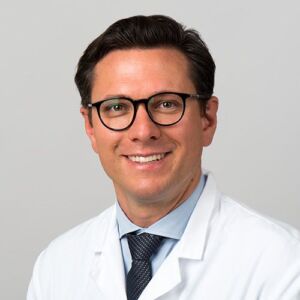This first requires pre-treatment with chemotherapy and/or radiotherapy to create space for the new blood stem cells. In addition to new blood formation, a new immune system also develops after the transplant, which helps to heal the underlying disease.
Over 1000 allogeneic stem cell transplants have been performed at the USZ since 1976. Currently, around 60 patients receive an allogeneic stem cell transplant at our center every year.
Diseases
Allogeneic stem cell transplants are generally used to treat diseases of the hematopoietic system. In most cases, these are advanced or aggressive forms of leukemia (e.g. acute myeloid leukemia or acute lymphocytic leukemia), disorders of hematopoiesis (myelodysplastic syndrome or aplastic anemia) or congenital disorders of hematopoiesis or the resulting immune system. An allogeneic stem cell transplant may also be indicated for lymph gland cancer or metabolic diseases.
The necessity of an allogeneic stem cell transplant is discussed in our tumor board and discussed with you in detail.
Procedure
The procedure and coordination of an allogeneic stem cell transplant are complex because numerous preliminary examinations of you and your donor are necessary.
Initial consultation: The first step is an in-depth consultation with our specialists in our outpatient clinic. We will explain the process of an allogeneic stem cell transplant to you in detail and discuss possible treatment alternatives. A series of blood samples are also taken. This is an important prerequisite for finding a potential donor.
Donor search: The availability of a suitable and healthy donor is a prerequisite for carrying out an allogeneic stem cell transplant. At the USZ, we carry out transplants from family donors and third-party donors. Family donors are primarily siblings. If this is not possible, we will work with Swiss Blood Stem Cells (SBSC) to search for a third-party donor worldwide. If an optimal donor cannot be found, we also carry out transplants at the USZ using blood stem cells from adult children or parents (haploidentical blood stem cell transplantation). In the vast majority of cases, this enables us to find a suitable donor for you.
Preliminary examinations: In the four weeks before the allogeneic stem cell transplant, you will be put through your paces again and we will determine the current stage of your disease. It helps us to determine whether you are suitable for an allogeneic stem cell transplant and which type of pre-treatment is best for you. You will also get to know our modern SUED2 E transplant ward during the appointment for the preliminary examinations.
Pre-treatment: Pre-treatment (conditioning) is an important component for a successful allogeneic stem cell transplant. It consists of chemotherapy, possibly in combination with radiotherapy. When selecting the best pre-treatment, our specialists take into account your general condition, your organ functions, your previous therapies and the current status of your illness. Pre-treatment already takes place on our SUED2 E transplant ward and takes around five to ten days, depending on the type.
Transplantation: The actual transplantation takes place one to two days after completion of the pre-treatment in our transplantation ward. This is a simple infusion of the donor’s blood stem cells via a venous catheter. You will be supervised by our experienced specialist nursing experts. The blood stem cells find their way into the bone marrow on their own. It usually takes ten to 20 days for the transplant to grow in the bone marrow. Immunosuppressive therapy in tablet form is necessary. This can usually be completely terminated in the further course.
Aftercare: Good aftercare is extremely important for the success of the transplant. You will therefore receive close support from our experts in the special outpatient clinic. We usually see you twice a week in the period immediately after you leave. Depending on the individual progression, the follow-up intervals are then extended (e.g. monthly, every six months). Our experts will advise you on immunosuppressive therapy, nutrition, vaccinations and possible side effects of the transplant and support you in getting back to your everyday life.
Why to USZ?
At the USZ, you will be looked after from day one by an experienced and multi-professional team that will support you at all levels. In addition to medical care, this includes the following disciplines: nutritional counseling, social counseling, physiotherapy, psycho-oncology and many others.
The USZ is a center for stem and immune cell therapy accredited by the European Society for Blood and Marrow Transplantation (EBMT) (JACIE accreditation).
